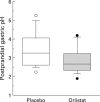Role of lipase in the regulation of postprandial gastric acid secretion and emptying of fat in humans: a study with orlistat, a highly specific lipase inhibitor
- PMID: 10807887
- PMCID: PMC1756442
- DOI: 10.1136/gut.46.6.774
Role of lipase in the regulation of postprandial gastric acid secretion and emptying of fat in humans: a study with orlistat, a highly specific lipase inhibitor
Abstract
Background and aims: To investigate the importance of lipase on gastric functions, we studied the effects of orlistat, a potent and specific inhibitor of lipase, on postprandial gastric acidity and gastric emptying of fat.
Methods: Fourteen healthy volunteers participated in a double blind, placebo controlled, randomised study. In a two way cross over study with two test periods of five days, separated by at least 14 days, orlistat 120 mg three times daily or placebo was given with standardised daily meals. In previous experiments we found that this dose almost completely inhibited postprandial duodenal lipase activity. Subjects underwent 28 hour intragastric pH-metry on day 4, and a gastric emptying study with a mixed meal (800 kcal) labelled with (999m)Tc sulphur colloid (solids) and (111In)thiocyanate (fat) on day 5. Gastric pH data were analysed for three postprandial hours and the interdigestive periods.
Results: Orlistat inhibited almost completely (by 75%) lipase activity and accelerated gastric emptying of both the solid (by 52%) and fat (by 44%) phases of the mixed meal (p<0.03). Orlistat increased postprandial gastric acidity (from a median pH of 3.3 to 2.7; p<0.01). Postprandial cholecystokinin release was lower with orlistat (p<0.03).
Conclusion: Lipase has an important role in the regulation of postprandial gastric acid secretion and fat emptying in humans. These effects might be explained by lipolysis induced release of cholecystokinin.
Figures





Similar articles
-
Role of lipase in the regulation of upper gastrointestinal function in humans.Am J Physiol. 1997 Sep;273(3 Pt 1):G612-20. doi: 10.1152/ajpgi.1997.273.3.G612. Am J Physiol. 1997. PMID: 9316463 Clinical Trial.
-
Influence of orlistat on the regulation of gallbladder contraction in man: a randomized double-blind placebo-controlled crossover study.Dig Dis Sci. 1996 Dec;41(12):2404-8. doi: 10.1007/BF02100135. Dig Dis Sci. 1996. PMID: 9011450 Clinical Trial.
-
Effects of lipase inhibition on gastric emptying of, and on the glycaemic, insulin and cardiovascular responses to, a high-fat/carbohydrate meal in type 2 diabetes.Diabetologia. 2004 Dec;47(12):2208-14. doi: 10.1007/s00125-004-1591-4. Epub 2004 Dec 15. Diabetologia. 2004. PMID: 15662558
-
Cholecystokinin in the control of gastric acid and plasma gastrin and somatostatin secretion in healthy subjects and duodenal ulcer patients before and after eradication of Helicobacter pylori.J Physiol Pharmacol. 1994 Dec;45(4 Suppl 1):3-66. J Physiol Pharmacol. 1994. PMID: 7787215 Review.
-
Mode of action of orlistat.Int J Obes Relat Metab Disord. 1997 Jun;21 Suppl 3:S12-23. Int J Obes Relat Metab Disord. 1997. PMID: 9225172 Review.
Cited by
-
Lipids in the Stomach - Implications for the Evaluation of Food Effects on Oral Drug Absorption.Pharm Res. 2018 Feb 8;35(3):55. doi: 10.1007/s11095-017-2289-x. Pharm Res. 2018. PMID: 29423732 Review.
-
Gastric Sensory and Motor Functions and Energy Intake in Health and Obesity-Therapeutic Implications.Nutrients. 2021 Apr 1;13(4):1158. doi: 10.3390/nu13041158. Nutrients. 2021. PMID: 33915747 Free PMC article. Review.
-
Small bowel review: Normal physiology, part 1.Dig Dis Sci. 2003 Aug;48(8):1546-64. doi: 10.1023/a:1024719925058. Dig Dis Sci. 2003. PMID: 12924651 Review. No abstract available.
-
The Effect of Digestion and Drug Load on Halofantrine Absorption from Self-nanoemulsifying Drug Delivery System (SNEDDS).AAPS J. 2016 Jan;18(1):180-6. doi: 10.1208/s12248-015-9832-7. AAPS J. 2016. PMID: 26486790 Free PMC article.
-
Dietary and lifestyle factors in functional dyspepsia.Nat Rev Gastroenterol Hepatol. 2013 Mar;10(3):150-7. doi: 10.1038/nrgastro.2012.246. Epub 2013 Jan 8. Nat Rev Gastroenterol Hepatol. 2013. PMID: 23296252 Review.
References
Publication types
MeSH terms
Substances
LinkOut - more resources
Full Text Sources
Other Literature Sources
Medical
